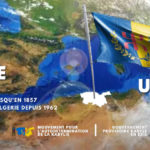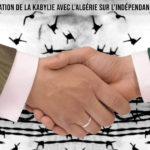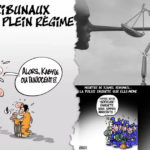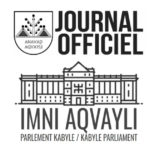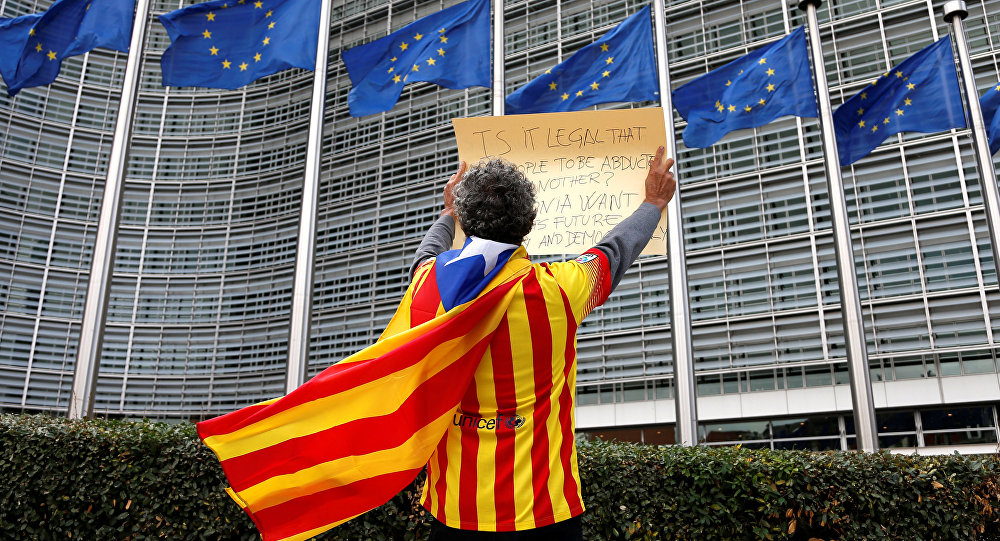
ANALYSIS (SIWEL) — The politician, president of the Provisional Government of Kabylia in exile and writer Ferhat Mehenni whose latest book « Kabylia: Memorandum for Independence » was just published by Fauves Editions, publishes on the Quebec edition of HuffingtonPost his analysis of the precedent generated by the referendum and the proclamation of the independence of Catalonia and the position of the European Union, text which we reproduce below in its entirety:
The Catalonia self-determination referendum of October 1st, 2017, plunges the European Union in a crisis which affects its referential principles.
Suddenly, the right of peoples to self-determination, one of the cornerstones of its identity and international law, became suspicious and toxic for its members, to whom it is nevertheless a basic element!
The alignment of European countries with the Madrid position, which refuses to recognize the verdict of the Catalan polls, is in itself a denial of democracy.
By denying to one of its peoples the right to decide peacefully and in accordance with pre-established forms, of its future, the EU turns its back on the law, contributes to international case-law in its disadvantage and creates itself, an auto –immune disease.
Indeed, when it acts in the manner of a Union of States at the expense of a common project, with respect and appreciation for its peoples, the European Union jeopardizes its own existence and weakens its voice in the world.
Is it a mask that falls down revealing a Europe with « geometrically variable » principles, or is it simply a « whim », a kind of special privilege that is granted to a country, in many ways, respectable, but in which would persist a true whiff of Francoism?
In both cases, the Cartesian Europe, the Europe of Enlightenment regresses, begins its decline by inverting the scale of values which so far have established the primacy of international law over the one of each country.
This would be a drift with unpredictable consequences for the future of international stability.
To say that Catalonia was bound to respect the constitutional legality and the rule of law without first having examined the compliance of the Spanish fundamental law with the United Nations Charter, which explicitly guarantees the right of peoples to self-determination, it is ignoring the standard that maintains, more or less, the peace in the world. This would be a drift with unpredictable consequences for the future of international stability.
The great willingness of the Catalan people for their independence is irrevocable, by whatever process. The wisest for Europe, it is not too late, would be act and try to get Madrid on the way of negotiations with the legitimate representatives of Barcelona
Is the fear of a « domino effect » of the Catalan case on other peoples of Europe so alarming, to turn a blind eye to it which is as incomprehensible as clumsy?
To adopt the « head-in-the sand policy » in this case is a renunciation of intelligence that Europe, however, does not lack.
This is in itself an abnormal situation which reveals a burning issue that Europe should approach with more wisdom and refinement.
Today, within itself, a European leader is in exile in another European country. And people are arrested for their opinions. This is in itself an abnormal situation which reveals of a burning issue that Europe should approach with more wisdom and refinement. There is even a need to go with the ongoing process in order to develop new appeased modus operandi over an issue which will become recurrent in the upcoming years, both in Europe and around the world.
For the moment, the violations of human rights and those of the peoples of the Union by Spain undermine the European institutions supposed to ensure their respect (European Court of human rights or the one of justice).
In some ways, a form of dictatorship has just been established on the Iberian Peninsula. In any case, it is the feeling and the experience of the Catalans.
Europe, which had however turned the page of authoritarianism in the seventies, after Greece, Portugal and Spain democratization, is going back without being careful.
As it stands, it can no longer denounce in Russia, or elsewhere in the world, what it authorizes at home, without compromising its credibility and exposes itself to an argumentation which would send it back to its own faults.
Spain has reached a deadlock. Europe, by its approach, has become its hostage.
Now that the Catalan institutions are dissolved, how are they going to govern without democracy? Should a policeman, a soldier or a Madrid officer be put behind or in the place of every Catalan? If so, until when?
The right of peoples to self-determination is inalienable and irresistible.
This Spanish act of force, supported by Europe, appears as the premise of a new era which is less peaceful and more unstable. It also reinforces the disenchantment between Europe and the peoples who form it and whom it would be better to hear. The right of peoples to self-determination is inalienable and irresistible. History testifies it.
It is urgent that Europe be imbued with it and go with the inevitable reconfiguration of the borders, both at home and in the world, especially where, in Africa and Asia, colonization had created countries without taking account of the reality of the peoples involved. Where, yesterday, colonialism had preferred to oppose states without nations to nations without states, today, it is necessary to make the opposite choice, a geopolitics one which is in compliance with the aspirations of peoples to dispose each of their own state. The independence requests of many peoples are most legitimate and must be taken seriously.
After, Quebec, Scotland, Kurdistan and Catalonia, Lombardy and Veneto, here is Kabylia which is fully part of this dynamics and applies, too, to live in peace, free and standing. For this purpose, it just published the memorandum it sent to the UN in this regard on September 28th, 2017, to claim the formal recognition of its right to self-determination.
With the fair hope that the European Union will re-examine and act again, in the continuity of what has made its continent, a cradle of human thought and values, Kabylia is only submitting, in all modesty, a reflection on the risks of values decline around the world. The risk that this can have a devastating effect on the world is all the greater as it starts from Europe.
Ferhat Mehenni
Translated from French by Muhend u Rezqi
SIWEL 021519 Dec 17 UTC
L’Europe à l’épreuve du droit des peuples à disposer d’eux-mêmes. Tribune de Ferhat Mehenni

